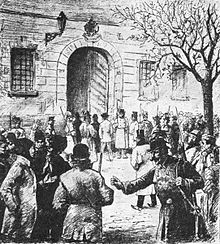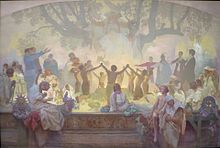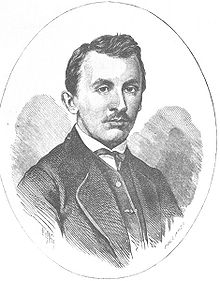142:, and urged the adoption of civil liberties. Under its political wing, as a more radical, underground group, Omladina arose in the late 1870s in the industrial city of Kladno. Using periodicals and reformist newspapers, the educated, middle class liberals and radicals trumpeted their support for a sovereign parliament, freedom of the press and assembly, and implored vigorously for the protection of workers. Cooperation between these students and laborers in the movement flourished at unprecedented levels and progressive journals such as Omladina, Rozhledy, and Javnost began to call for workers reform incessantly. Not surprisingly, the government and its church affiliates deemed Omladina and such reformist groups as illegal, imprisoned many protestors and editors, and even arrested students possessing progressive literature. Debates exploded across the country, and Czech Socialists and Progressives vociferated their anger and discontent through debate and political societies. Events in 1871 like the
198:
radicalism remained. Through their leadership, their views spread throughout the empire and factionalized according to certain groups and sects, igniting the "powder keg" so often utilized by World War I historians. Czech radicalism of the late
Habsburg period imparted a very mixed legacy to the new state, a legacy that often compromised political stability. On one hand, the Czechs emerged from the Trial and its aftermaths with a political structure that included a variety of parties with complex infrastructures necessary in a modern political society. However, their nationalistic fervor often dampened their willingness to compromise, damaging the Austro-Hungarian and Central European stability, thus culminating in the outbreak of the War.
185:
press, and radical groups quickly denounced the murder, the government pressed onward. Josef Soukup aptly stated that the Mrva case was "the one tare among the wheat". The trial began on
January 15, 1894, in a closed military tribunal. Charges ranged from conspiracy to high treason to public disorder to revolutionary activities. Prominent progressives such as Dr. Alois Rašín and Josef Škába were among the incarcerated. The sentences came as highly anticlimactic with the six defendants of the murder case itself received ten years each. 62 other defendants received sporadic jail sentences that collectively accumulated 90 years in prison.
33:
155:
97:
68:
93:
Furthermore, a fettered peasantry loomed in the lower rung of Serbia, and philosophies of liberalism, romanticism, and radicalism stirred the minds of the aspiring youth. Ideologies of force and war became mechanisms through which the Serbs and other minorities believed could relinquish themselves from the burdens of economic disconnectedness and political repression.
108:(1846–1875). As a young, vibrant leader of the evolving radicalists, he took center stage in the intellectual, economic, and political changes that would ensue in the following decades. He urged the organization of a radicalist party to wage "a struggle against everything which has grown too old- a struggle of the young generation against the old".
163:
in the
Habsburg monarchy and in the Austro-Hungarian government. They began to aggressively demand for universal suffrage due to their relationship with the workers but also acknowledged the fact that such legislation or change would bring the NLP thousands of adherents, including the working class. Scholars such as
167:
of the
Progressive movement, Antonín Hajn, and Jan Slavík concurred, and on March 17, 1893, Slavík presented the universal suffrage bill to the Parliament. Opposition mounted and demonstrations followed. June 18, 1893, saw a crowd of 30,000 while on May 15 (St. John's Day), a group of students draped
162:
The
National Liberal Party began to develop a small backing in the Austrian-Hungarian Parliament; Young Czechs had an avenue for vocal opposition. In the Bohemian Diet as well, the Young Czechs made a dramatic growth, defeating their rivals by 11 seats. Their storms of protest began gaining attention
137:
As
Bohemian (Czech) radicalism reached its climax, many within the Central European region attached themselves to this growing ideology that sought to progressively incorporated all citizens into a political environment. The Young Czech Party also known as the National Liberal Party (formed in 1874)
184:
and after a political murder on 23 December, Omladina was connected to the murder of police informer Rudolf Mrva. With a carte blanche to prosecute, the government arrested 76 Omladina "conspirators" aged 17–22 and charged two working class
Omladina members with the actual murder. While the Czech
197:
The long-term effects were the growing disillusioned populace and their unbelievable detestation of the upper class and the
Habsburg authority. The liberals turned radicals became increasingly more vicious and while the Trials surely slowed their growth, the vehement sentiments of socialism and
193:
The Young Czechs began to dissociate from the main party and radicalist actions subsided for a period of time. The
National Liberal Party was banned from the local Diet and many newspapers were censored. Národní Listy, Javnost, and Omladina faced increasingly harsh government restrictions. The
92:
By 1871, Serbia became embroiled in a middle class development that was stunted by a slow economy, as well as grew overwhelmingly in urban populations. This laboring, more working class bourgeoisie espoused a liberal ideology that seemed revolutionary to
Austrian-Hungarian imperial control.
88:
rebels and their associates began to factionalize and represent many different political sects of the distinct, multi-ethnic nation emphasizing those enlightenment philosophies. What became a Pan-Slavic movement derived from the ideologies of the past French Revolutions in 1789.
206:"Though young Czech radicalism had been discredited, a new radical generation had been formed which constituted a greater danger to the Habsburgs because it aspired to establish genuinely popular political parties aiming at social as well as political reforms".
172:. the straw that broke the camel's back occurred on December 23, 1893. A change in governments due to political inefficiency brought a new political regime headed by Prince Alfred Windischgrätz. His hardline approach and the newly drawn
84:
Since the European Revolutions of 1848, the face of Central Europe became even more inundated with encompassing enlightenment ideals. In what was Austria-Hungary or the old Habsburg imperial lands,
116:
169:
112:
497:
507:
532:
180:
parliament) voted 185 to 73 to uphold a state of emergency in Fürst von Thun's Bohemia. The Governor declared a proverbial
522:
492:
467:
462:
477:
194:
government increased severe measures against the minority and the Progressive movement was momentarily halted.
146:
and demonstrations of political activism prepared the Habsburg monarchy for similar events in their own land.
512:
487:
482:
502:
472:
17:
104:
One of the men who contributed to this movement and led to the Omladina Trials was Serb gentryman
537:
527:
123:
brought his radicalist ideas as a spokesperson of the Young Czech Party from his days working at
59:
before the court as well as specifically convicting 68 Czech Nationalists of radical activities.
517:
105:
8:
173:
80:
cycle No.18: The Oath of Omladina under the Slavic Linden Tree: The Slavic Revival (1926)
56:
424:
Stoianovich, Traian (1959). "The Pattern of Serbian Intellectual Evolution: 1830-1880".
441:
125:
85:
226:
433:
164:
45:
71:
437:
456:
177:
143:
111:
Other future Social Democrats and Progressives joined the movement including
76:
32:
390:
The Young Czech Party 1874-1901 and the Emergence of a Multi-Party System
181:
154:
120:
445:
52:
96:
139:
67:
399:
The Habsburg Monarchy C. 1765-1918 From Enlightenment to Eclipse
129:, a successful, progressive newspaper of the mid-19th century.
49:
269:
257:
353:
341:
317:
305:
245:
405:
281:
406:
Seton-Watson, Hugh; Seton-Watson, Christopher (1981).
365:
293:
329:
454:
132:
36:Contemporary illustration of the Omladina trial
48:regional capital of Prague, ostensibly placed
62:
414:
263:
188:
423:
323:
311:
275:
251:
426:Comparative Studies in Society and History
153:
95:
66:
31:
14:
455:
387:
371:
359:
347:
299:
287:
419:. Hamden, Connecticut: Archon Books.
396:
335:
201:As Historian Bruce Garver explains:
417:A History of the Czechs and Slovaks
24:
392:. New Haven, Connecticut: Yale UP.
229:[Spoiled c. k. birthday].
224:
25:
549:
498:Austria-Hungary–Serbia relations
168:a huge noose around a statue of
508:Czech Republic–Serbia relations
401:. New York: Palgrave MacMillan.
218:
13:
1:
381:
149:
533:Trials in the Czech Republic
415:Seton-Watson, R. W. (1965).
138:advocated universal manhood
133:Omladina and its development
7:
523:Politics of Austria-Hungary
493:Rebels from Austria-Hungary
10:
554:
408:The Making of a New Europe
227:"Zkažené c. k. narozeniny"
63:Advent of Czech radicalism
438:10.1017/S0010417500000256
388:Garver, Bruce M. (1978).
189:Consequences of the trial
119:as editors. Furthermore,
211:
117:Antonín Pravoslav Veselý
468:1894 in Austria-Hungary
463:1893 in Austria-Hungary
478:19th century in Prague
159:
101:
81:
37:
157:
99:
70:
35:
513:History of anarchism
397:Okey, Robin (2001).
27:1894 trial in Prague
488:Anarcho-syndicalism
483:Anarchism in Europe
362:, pp. 186–187.
350:, pp. 182–186.
290:, pp. 178–179.
278:, pp. 262–263.
57:anarcho-syndicalism
410:. London: Methuen.
160:
102:
82:
44:, convened in the
38:
503:Czech nationalism
264:Seton-Watson 1965
106:Svetozar Marković
100:Svetozar Marković
16:(Redirected from
545:
473:1894 in politics
449:
420:
411:
402:
393:
375:
369:
363:
357:
351:
345:
339:
333:
327:
324:Stoianovich 1959
321:
315:
312:Stoianovich 1959
309:
303:
297:
291:
285:
279:
276:Stoianovich 1959
273:
267:
261:
255:
252:Stoianovich 1959
249:
243:
242:
240:
238:
225:Drchal, Václav.
222:
176:(lower house of
46:Austro-Hungarian
21:
553:
552:
548:
547:
546:
544:
543:
542:
453:
452:
384:
379:
378:
370:
366:
358:
354:
346:
342:
334:
330:
322:
318:
310:
306:
298:
294:
286:
282:
274:
270:
262:
258:
250:
246:
236:
234:
223:
219:
214:
191:
170:Emperor Franz I
152:
135:
65:
28:
23:
22:
15:
12:
11:
5:
551:
541:
540:
538:Anti-anarchism
535:
530:
528:Treason trials
525:
520:
515:
510:
505:
500:
495:
490:
485:
480:
475:
470:
465:
451:
450:
432:(3): 242–272.
421:
412:
403:
394:
383:
380:
377:
376:
374:, p. 188.
364:
352:
340:
338:, p. 273.
328:
326:, p. 270.
316:
314:, p. 266.
304:
302:, p. 179.
292:
280:
268:
266:, p. 229.
256:
254:, p. 260.
244:
216:
215:
213:
210:
209:
208:
190:
187:
151:
148:
134:
131:
72:Alphonse Mucha
64:
61:
42:Omladina Trial
26:
9:
6:
4:
3:
2:
550:
539:
536:
534:
531:
529:
526:
524:
521:
519:
516:
514:
511:
509:
506:
504:
501:
499:
496:
494:
491:
489:
486:
484:
481:
479:
476:
474:
471:
469:
466:
464:
461:
460:
458:
447:
443:
439:
435:
431:
427:
422:
418:
413:
409:
404:
400:
395:
391:
386:
385:
373:
368:
361:
356:
349:
344:
337:
332:
325:
320:
313:
308:
301:
296:
289:
284:
277:
272:
265:
260:
253:
248:
232:
228:
221:
217:
207:
204:
203:
202:
199:
195:
186:
183:
179:
178:Cisleithanian
175:
171:
166:
156:
147:
145:
144:Paris Commune
141:
130:
128:
127:
126:Národní listy
122:
118:
114:
109:
107:
98:
94:
90:
87:
79:
78:
77:The Slav Epic
73:
69:
60:
58:
54:
51:
47:
43:
40:In 1894, the
34:
30:
19:
429:
425:
416:
407:
398:
389:
367:
355:
343:
331:
319:
307:
295:
283:
271:
259:
247:
235:. Retrieved
230:
220:
205:
200:
196:
192:
161:
136:
124:
113:F. V. Lorenz
110:
103:
91:
83:
75:
41:
39:
29:
518:Pan-Slavism
372:Garver 1978
360:Garver 1978
348:Garver 1978
300:Garver 1978
288:Garver 1978
182:martial law
165:Alois Rašín
158:Alois Rašín
457:Categories
382:References
233:(in Czech)
231:CS Magazin
150:The trials
121:Jan Neruda
336:Okey 2001
174:Reichsrat
53:anarchism
140:suffrage
86:Bohemian
18:Omladina
237:May 26,
446:177875
444:
442:JSTOR
212:Notes
50:Czech
239:2020
115:and
55:and
434:doi
74:'s
459::
440:.
428:.
448:.
436::
430:1
241:.
20:)
Text is available under the Creative Commons Attribution-ShareAlike License. Additional terms may apply.



